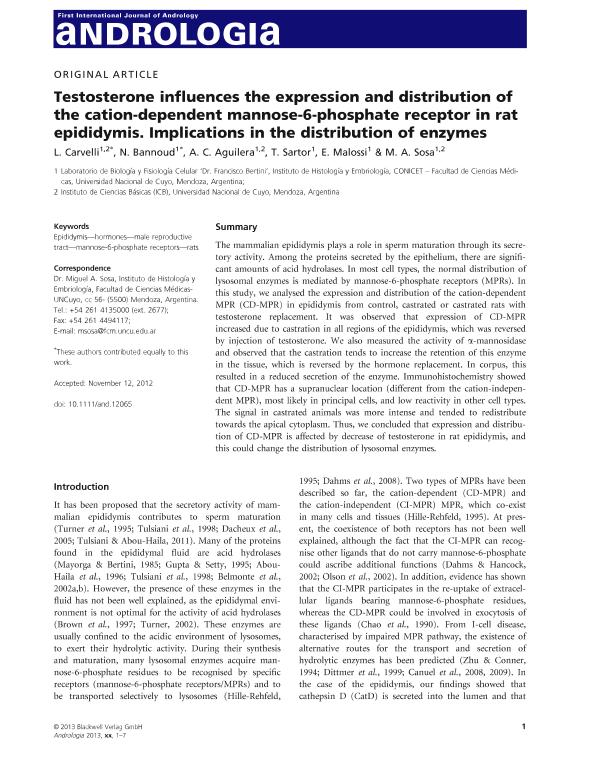Artículo
Testosterone influences the expression and distribution of the cation-dependent mannose-6-phosphate receptor in rat epididymis. Implications in the distribution of enzymes
Carvelli, Flavia Lorena ; Bannoud, Nadia
; Bannoud, Nadia ; Aguilera, Andrea Carolina
; Aguilera, Andrea Carolina ; Sartor, Tirso
; Sartor, Tirso ; Malossi, Elias; Sosa Escudero, Miguel Angel
; Malossi, Elias; Sosa Escudero, Miguel Angel
 ; Bannoud, Nadia
; Bannoud, Nadia ; Aguilera, Andrea Carolina
; Aguilera, Andrea Carolina ; Sartor, Tirso
; Sartor, Tirso ; Malossi, Elias; Sosa Escudero, Miguel Angel
; Malossi, Elias; Sosa Escudero, Miguel Angel
Fecha de publicación:
07/01/2013
Editorial:
Wiley Blackwell Publishing, Inc
Revista:
Andrologia
ISSN:
0303-4569
Idioma:
Inglés
Tipo de recurso:
Artículo publicado
Clasificación temática:
Resumen
The mammalian epididymis plays a role in sperm maturation through its secretory activity. Among the proteins secreted by the epithelium, there are significant amounts of acid hydrolases. In most cell types, the normal distribution of lysosomal enzymes is mediated by mannose-6-phosphate receptors (MPRs). In this study, we analysed the expression and distribution of the cation-dependent MPR (CD-MPR) in epididymis from control, castrated or castrated rats with testosterone replacement. It was observed that expression of CD-MPR increased due to castration in all regions of the epididymis, which was reversed by injection of testosterone. We also measured the activity of α-mannosidase and observed that the castration tends to increase the retention of this enzyme in the tissue, which is reversed by the hormone replacement. In corpus, this resulted in a reduced secretion of the enzyme. Immunohistochemistry showed that CD-MPR has a supranuclear location (different from the cation-independent MPR), most likely in principal cells, and low reactivity in other cell types. The signal in castrated animals was more intense and tended to redistribute towards the apical cytoplasm. Thus, we concluded that expression and distribution of CD-MPR is affected by decrease of testosterone in rat epididymis, and this could change the distribution of lysosomal enzymes.
Archivos asociados
Licencia
Identificadores
Colecciones
Articulos(IHEM)
Articulos de INST. HISTOLOGIA Y EMBRIOLOGIA DE MEND DR.M.BURGOS
Articulos de INST. HISTOLOGIA Y EMBRIOLOGIA DE MEND DR.M.BURGOS
Citación
Carvelli, Flavia Lorena; Bannoud, Nadia; Aguilera, Andrea Carolina; Sartor, Tirso; Malossi, Elias; et al.; Testosterone influences the expression and distribution of the cation-dependent mannose-6-phosphate receptor in rat epididymis. Implications in the distribution of enzymes; Wiley Blackwell Publishing, Inc; Andrologia; 7-1-2013; 1-6
Compartir
Altmétricas



